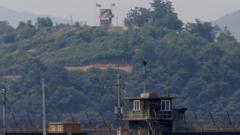In a dramatic escalation of tensions on the Korean Peninsula, South Korea confirmed it fired warning shots earlier this week at North Korean soldiers who briefly crossed the military demarcation line of the heavily fortified border. This bold move has drawn sharp criticism and accusations of provocation from North Korean state media, which branded the action as a risky step towards "uncontrollable" tensions between the two adversaries.
The incident, which occurred on Tuesday around 3 PM local time, came to light just as South Korea's new President Lee Jae Myung was preparing for a diplomatic journey to Tokyo and Washington. The move by North Korean troops into the southern territory sparked an immediate military response, with South Korea utilizing a machine gun to fire over ten warning shots, as reported by North Korean Army Lt Gen Ko Jong Chol.
In response to this military action, North Korean outlets stated that the confrontation could lead to an irretrievable escalation in the dangerous face-off at the southern border, where there are significant forces positioned on both sides.
This occurrence is indicative of the overall deterioration of inter-Korean relations, especially as leader Kim Jong Un's sister recently dismissed reconciliation efforts from President Lee's government. Following the June election win by Lee, there was initial hope for improving ties; however, rapid developments from Pyongyang, including border sealing initiatives, indicate a tightening of hostilities.
Previously, South Korea had taken steps to de-escalate tensions, including halting loudspeaker broadcasts that transmit propaganda to North Korea, an act seen by Pyongyang as a declaration of war. These broadcasts had faced constant threats from the North, demonstrating the razor-thin line separating aggression and diplomacy on the Korean Peninsula.
The two Koreas have remained technically at war since the end of the Korean War in 1953, as no formal peace treaty was ever signed. Tensions continue to pervade the region, with the prospect of dialogue increasingly overshadowed by military posturing and rhetoric from both sides.



















